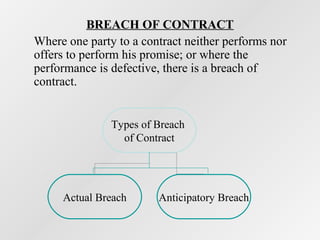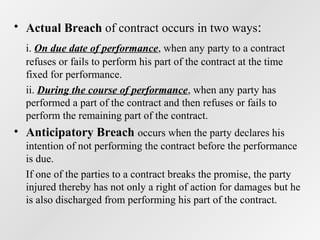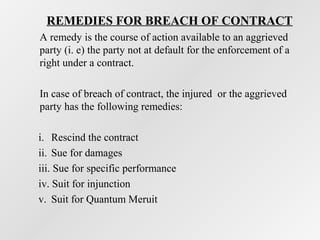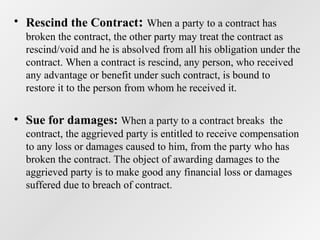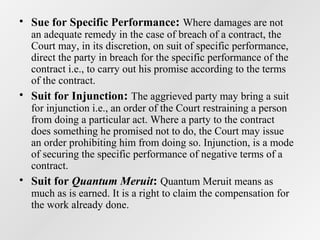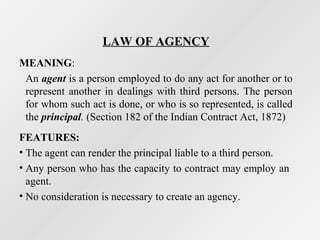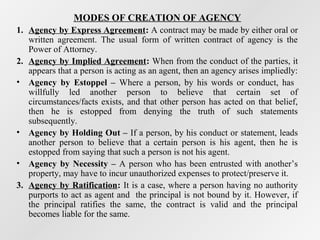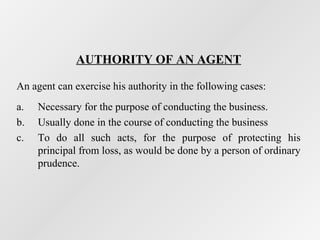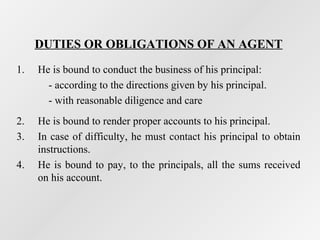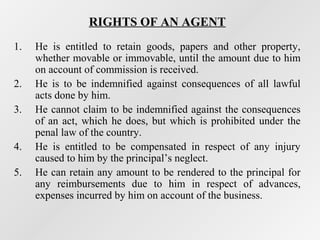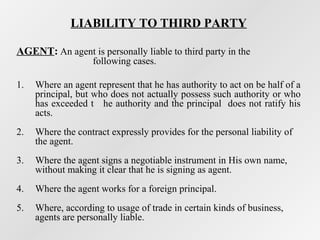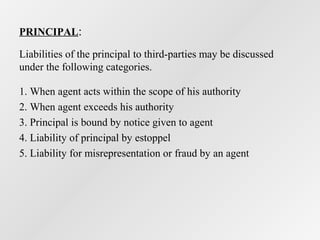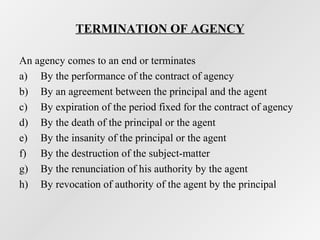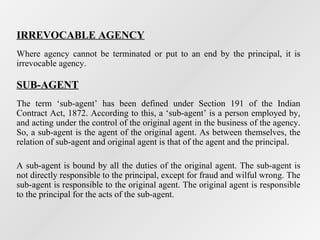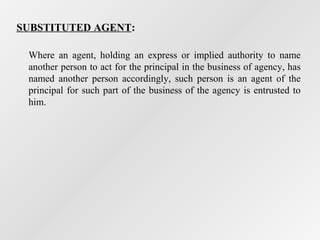Indian contract act part 4
- 1. BREACH OF CONTRACT Where one party to a contract neither performs nor offers to perform his promise; or where the performance is defective, there is a breach of contract. Types of Breach of Contract Actual Breach Anticipatory Breach
- 2. • Actual Breach of contract occurs in two ways: i. On due date of performance, when any party to a contract refuses or fails to perform his part of the contract at the time fixed for performance. ii. During the course of performance, when any party has performed a part of the contract and then refuses or fails to perform the remaining part of the contract. • Anticipatory Breach occurs when the party declares his intention of not performing the contract before the performance is due. If one of the parties to a contract breaks the promise, the party injured thereby has not only a right of action for damages but he is also discharged from performing his part of the contract.
- 3. REMEDIES FOR BREACH OF CONTRACT A remedy is the course of action available to an aggrieved party (i. e) the party not at default for the enforcement of a right under a contract. In case of breach of contract, the injured or the aggrieved party has the following remedies: i. Rescind the contract ii. Sue for damages iii. Sue for specific performance iv. Suit for injunction v. Suit for Quantum Meruit
- 4. • Rescind the Contract: When a party to a contract has broken the contract, the other party may treat the contract as rescind/void and he is absolved from all his obligation under the contract. When a contract is rescind, any person, who received any advantage or benefit under such contract, is bound to restore it to the person from whom he received it. • Sue for damages: When a party to a contract breaks the contract, the aggrieved party is entitled to receive compensation to any loss or damages caused to him, from the party who has broken the contract. The object of awarding damages to the aggrieved party is to make good any financial loss or damages suffered due to breach of contract.
- 5. • Sue for Specific Performance: Where damages are not an adequate remedy in the case of breach of a contract, the Court may, in its discretion, on suit of specific performance, direct the party in breach for the specific performance of the contract i.e., to carry out his promise according to the terms of the contract. • Suit for Injunction: The aggrieved party may bring a suit for injunction i.e., an order of the Court restraining a person from doing a particular act. Where a party to the contract does something he promised not to do, the Court may issue an order prohibiting him from doing so. Injunction, is a mode of securing the specific performance of negative terms of a contract. • Suit for Quantum Meruit: Quantum Meruit means as much as is earned. It is a right to claim the compensation for the work already done.
- 6. LAW OF AGENCY MEANING: An agent is a person employed to do any act for another or to represent another in dealings with third persons. The person for whom such act is done, or who is so represented, is called the principal. (Section 182 of the Indian Contract Act, 1872) FEATURES: • The agent can render the principal liable to a third person. • Any person who has the capacity to contract may employ an agent. • No consideration is necessary to create an agency.
- 7. MODES OF CREATION OF AGENCY 1. Agency by Express Agreement: A contract may be made by either oral or written agreement. The usual form of written contract of agency is the Power of Attorney. 2. Agency by Implied Agreement: When from the conduct of the parties, it appears that a person is acting as an agent, then an agency arises impliedly: • Agency by Estoppel – Where a person, by his words or conduct, has willfully led another person to believe that certain set of circumstances/facts exists, and that other person has acted on that belief, then he is estopped from denying the truth of such statements subsequently. • Agency by Holding Out – If a person, by his conduct or statement, leads another person to believe that a certain person is his agent, then he is estopped from saying that such a person is not his agent. • Agency by Necessity – A person who has been entrusted with another’s property, may have to incur unauthorized expenses to protect/preserve it. 3. Agency by Ratification: It is a case, where a person having no authority purports to act as agent and the principal is not bound by it. However, if the principal ratifies the same, the contract is valid and the principal becomes liable for the same.
- 8. AUTHORITY OF AN AGENT An agent can exercise his authority in the following cases: a. b. c. Necessary for the purpose of conducting the business. Usually done in the course of conducting the business To do all such acts, for the purpose of protecting his principal from loss, as would be done by a person of ordinary prudence.
- 9. DUTIES OR OBLIGATIONS OF AN AGENT 1. He is bound to conduct the business of his principal: - according to the directions given by his principal. - with reasonable diligence and care 2. 3. He is bound to render proper accounts to his principal. In case of difficulty, he must contact his principal to obtain instructions. He is bound to pay, to the principals, all the sums received on his account. 4.
- 10. RIGHTS OF AN AGENT 1. 2. 3. 4. 5. He is entitled to retain goods, papers and other property, whether movable or immovable, until the amount due to him on account of commission is received. He is to be indemnified against consequences of all lawful acts done by him. He cannot claim to be indemnified against the consequences of an act, which he does, but which is prohibited under the penal law of the country. He is entitled to be compensated in respect of any injury caused to him by the principal’s neglect. He can retain any amount to be rendered to the principal for any reimbursements due to him in respect of advances, expenses incurred by him on account of the business.
- 11. LIABILITY TO THIRD PARTY AGENT: An agent is personally liable to third party in the following cases. 1. Where an agent represent that he has authority to act on be half of a principal, but who does not actually possess such authority or who has exceeded t he authority and the principal does not ratify his acts. 2. Where the contract expressly provides for the personal liability of the agent. 3. Where the agent signs a negotiable instrument in His own name, without making it clear that he is signing as agent. 4. Where the agent works for a foreign principal. 5. Where, according to usage of trade in certain kinds of business, agents are personally liable.
- 12. PRINCIPAL: Liabilities of the principal to third-parties may be discussed under the following categories. 1. When agent acts within the scope of his authority 2. When agent exceeds his authority 3. Principal is bound by notice given to agent 4. Liability of principal by estoppel 5. Liability for misrepresentation or fraud by an agent
- 13. TERMINATION OF AGENCY An agency comes to an end or terminates a) By the performance of the contract of agency b) By an agreement between the principal and the agent c) By expiration of the period fixed for the contract of agency d) By the death of the principal or the agent e) By the insanity of the principal or the agent f) By the destruction of the subject-matter g) By the renunciation of his authority by the agent h) By revocation of authority of the agent by the principal
- 14. IRREVOCABLE AGENCY Where agency cannot be terminated or put to an end by the principal, it is irrevocable agency. SUB-AGENT The term ‘sub-agent’ has been defined under Section 191 of the Indian Contract Act, 1872. According to this, a ‘sub-agent’ is a person employed by, and acting under the control of the original agent in the business of the agency. So, a sub-agent is the agent of the original agent. As between themselves, the relation of sub-agent and original agent is that of the agent and the principal. A sub-agent is bound by all the duties of the original agent. The sub-agent is not directly responsible to the principal, except for fraud and wilful wrong. The sub-agent is responsible to the original agent. The original agent is responsible to the principal for the acts of the sub-agent.
- 15. SUBSTITUTED AGENT: Where an agent, holding an express or implied authority to name another person to act for the principal in the business of agency, has named another person accordingly, such person is an agent of the principal for such part of the business of the agency is entrusted to him.

